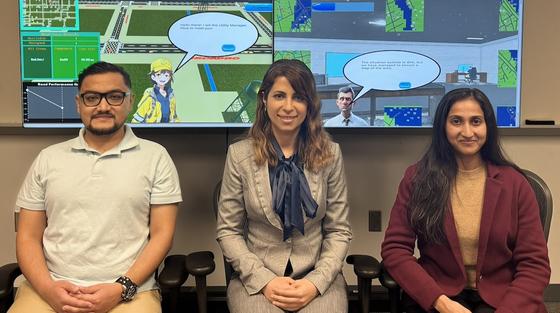Emergency management training doesn’t usually involve game controllers or artificial intelligence (AI) algorithms, but at George Mason University, faculty and students are redefining what it means to prepare for crises. Through cutting-edge, AI-augmented games, they’re transforming complex challenges into interactive learning experiences that build skills and resilience.
The project, led by Shima Mohebbi, an assistant professor in the Department of Systems Engineering and Operations Research at George Mason’s College of Engineering and Computing, along with PhD student Pavithra Sripathanallur Murali and Nischal Newar, MS Computer Science ’24, began as part of a National Science Foundation (NSF) initiative to develop simulation-based games for resilient infrastructure. Inspired by a webinar hosted by George Mason’s Center for Resilient and Sustainable Communities (C-RASC), where the Arlington County Department of Public Safety Communications and Emergency Management (PSCEM) shared their training needs, Mohebbi and her team expanded the project’s focus to emergency preparedness.
This shift led to the creation of two interactive AI-powered games—Go-Repair and Go-Rescue —which were developed over the course of a year to train utility managers and volunteers to make critical decisions in scenarios like infrastructure repairs and hurricane disaster evacuations.
The games simulate emergency scenarios and provide participants with tailored insights into their decision-making process. By using advanced algorithms, the games create a dynamic learning environment where strategies can be tested and adapted in real time.
“Go-Repair and Go-Rescue aim to provide volunteers and utility managers with realistic emergency scenarios in a comfortable environment, free from the stress and panic of an actual crisis,” said Mohebbi. “Through AI optimization and reinforcement learning models, players can assess whether their decisions lead to better or worse outcomes compared to the AI-generated solutions, helping them improve their skills in making science-formed decisions.”

Traditional emergency training has relied on Federal Emergency Management Agency (FEMA) guidelines and in-person role-playing sessions known as “war gaming.” While valuable, these methods have limitations in scope, flexibility, and interactive feedback. The AI-powered games introduce a new dimension to address these gaps.
The project’s impact is already gaining recognition. Go-Repair: Resilient Infrastructure Learning Game to Evaluate Restoration Decisions was named as one of four finalists in the 2024 Institute of Industrial and Systems Engineers (IISE) Data Analytics and Information Systems (DAIS) Student Mobile App Competition. Presenting the project at the conference in Montreal, Canada, this past May provided an invaluable opportunity to gather feedback and engage with other researchers tackling similar challenges. This exchange of ideas offered fresh perspectives and inspired new approaches to improve the game’s design and effectiveness.
“The feedback and engagement we’ve received, from Arlington County to the IISE community, are vital to advancing this project,” said Mohebbi. “The collaboration fosters innovation and ensures that our work aligns with the real needs of emergency responders and volunteers.”
“The gamified approach to emergency response training provides us with a unique tool to build the skills and confidence needed to serve our residents when they need us most,” said Hannah Winant, Arlington County deputy director, Department of Public Safety Communications and Emergency Management. “We’re deeply grateful for George Mason’s proactive, innovative work, and the opportunity to collaborate on this important effort. This project reflects our belief in the power of local partnerships to drive impactful, real-world solutions for the benefit of our community.”
Looking ahead, the team is incorporating feedback to introduce more complex resource allocation tasks and expand participation to include more George Mason students and utility managers. By continuously refining the games with fresh input, the goal is to develop a versatile and effective training tool emergency response and preparedness. As the project evolves, the team aims to expand its reach, offering a smarter, more scalable solution for communities nationwide.
In This Story
Related Stories
- January 22, 2025
- January 14, 2025
- December 17, 2024
- December 4, 2024
- August 21, 2024
A version of this content appears in the Fall 2025 print edition of the Mason Spirit Magazine with the title "AI-Powered Interactive Games Provide Emergency Response Training."
